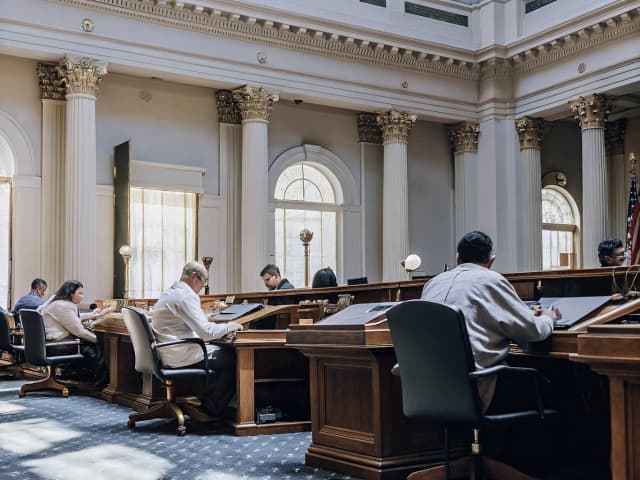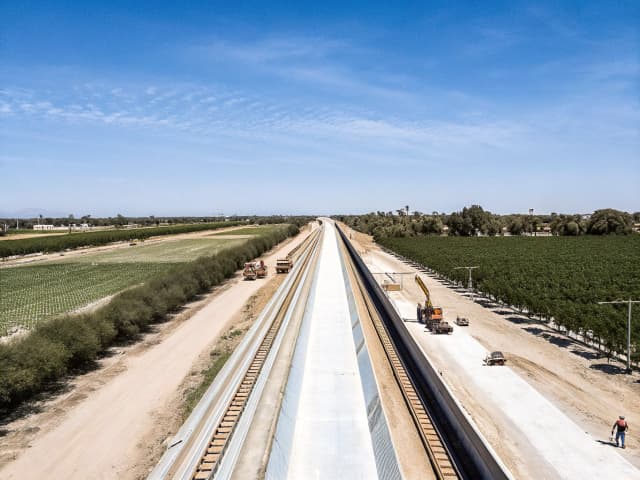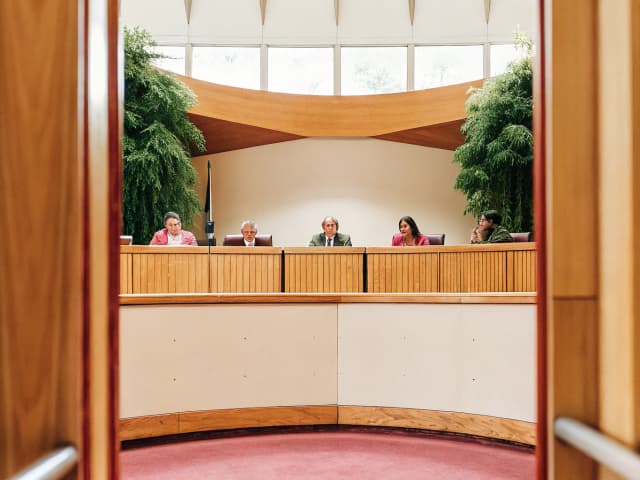Regional Transportation & Agency Governance

The Great Redwood Trail Agency.
Establishes the Great Redwood Trail Agency as a state subdivision. Requires the board to adopt an annual budget and conduct regular audits. Exempts the agency from local building and zoning rules, with limited property exceptions. Requires competitive bidding for work not performed by agency staff and bonds for bidders.
The Great Redwood Trail Agency.

Establishes the Great Redwood Trail Agency as a state subdivision. Requires the board to adopt an annual budget and conduct regular audits. Exempts the agency from local building and zoning rules, with limited property exceptions. Requires competitive bidding for work not performed by agency staff and bonds for bidders.

Public school governance: board member compensation.
Raises board member pay to scale with size and attendance. Caps county pay by class from $800 to $3,000 monthly. Sets ADA-based caps for district boards up to $4,500 monthly in large districts. Allows 5% annual increases, prorated pay, mileage, and pupil member compensation.
Public school governance: board member compensation.

Raises board member pay to scale with size and attendance. Caps county pay by class from $800 to $3,000 monthly. Sets ADA-based caps for district boards up to $4,500 monthly in large districts. Allows 5% annual increases, prorated pay, mileage, and pupil member compensation.

Transportation network company drivers: labor relations.
Establishes a PERB-led labor-relations regime for TNC drivers. Requires quarterly rides totals and driver lists to identify covered TNCs. Sets 10% and 30% support thresholds for driver organizations with remote elections. Imposes penalties for failing to submit lists and protects driver data privacy.
Transportation network company drivers: labor relations.

Establishes a PERB-led labor-relations regime for TNC drivers. Requires quarterly rides totals and driver lists to identify covered TNCs. Sets 10% and 30% support thresholds for driver organizations with remote elections. Imposes penalties for failing to submit lists and protects driver data privacy.

High-Speed Rail Authority: Senate confirmation.
Requires Senate confirmation for the Governor's five appointees to the High-Speed Rail Authority. Mandates geographical diversity in appointments to ensure statewide representation. Maintains the Authority's 11-member structure with four-year terms for voting members.
High-Speed Rail Authority: Senate confirmation.

Requires Senate confirmation for the Governor's five appointees to the High-Speed Rail Authority. Mandates geographical diversity in appointments to ensure statewide representation. Maintains the Authority's 11-member structure with four-year terms for voting members.

High-speed rail: economic opportunities.
Requires a comprehensive study of economic opportunities along California's high-speed rail corridor by 2027. Mandates infrastructure districts to dedicate most revenue to local infrastructure projects. Explores funding options including federal grants, public-private partnerships, and development rights. Evaluates strategies to benefit communities through housing, commercial activity, and transportation services.
High-speed rail: economic opportunities.

Requires a comprehensive study of economic opportunities along California's high-speed rail corridor by 2027. Mandates infrastructure districts to dedicate most revenue to local infrastructure projects. Explores funding options including federal grants, public-private partnerships, and development rights. Evaluates strategies to benefit communities through housing, commercial activity, and transportation services.

Alameda-Contra Costa Transit District: board of directors: election: compensation.
Restructures the transit board to require all seven directors be elected from specific wards instead of at-large positions. Establishes a $1,000 monthly director compensation that adjusts annually based on California Consumer Price Index. Requires directors to attend all regular board meetings to receive full monthly compensation. Allows candidates to submit 50 voter signatures or pay a $150 fee to run for director positions.
Alameda-Contra Costa Transit District: board of directors: election: compensation.

Restructures the transit board to require all seven directors be elected from specific wards instead of at-large positions. Establishes a $1,000 monthly director compensation that adjusts annually based on California Consumer Price Index. Requires directors to attend all regular board meetings to receive full monthly compensation. Allows candidates to submit 50 voter signatures or pay a $150 fee to run for director positions.

Transit districts: governing boards: compensation: nonvoting members.
Requires transit board members to use public transit monthly to receive compensation. Mandates two nonvoting members on transit boards to represent riders and labor unions. Establishes four alternate nonvoting members to ensure consistent stakeholder representation. Protects nonvoting members from retaliation for their board meeting participation.
Transit districts: governing boards: compensation: nonvoting members.

Requires transit board members to use public transit monthly to receive compensation. Mandates two nonvoting members on transit boards to represent riders and labor unions. Establishes four alternate nonvoting members to ensure consistent stakeholder representation. Protects nonvoting members from retaliation for their board meeting participation.

State Air Resources Board: board members: compensation.
Establishes equal pay for all Air Resources Board members by removing compensation restrictions. Eliminates the $100 daily attendance payment for elected officials on the board. Requires air districts to reimburse their appointed board members for work-related expenses.
State Air Resources Board: board members: compensation.

Establishes equal pay for all Air Resources Board members by removing compensation restrictions. Eliminates the $100 daily attendance payment for elected officials on the board. Requires air districts to reimburse their appointed board members for work-related expenses.

Labor: elective compensation under the Inflation Reduction Act of 2022.
Authorizes voluntary retroactive wage payments to clean energy workers to boost IRA incentives. Limited to renewable projects started in 2023 and completed by 2024. Excludes retaliation, misclassification, and unrelated violations from coverage. Enacts immediate effect with Labor Commissioner enforcement and a 2029 sunset.
Labor: elective compensation under the Inflation Reduction Act of 2022.

Authorizes voluntary retroactive wage payments to clean energy workers to boost IRA incentives. Limited to renewable projects started in 2023 and completed by 2024. Excludes retaliation, misclassification, and unrelated violations from coverage. Enacts immediate effect with Labor Commissioner enforcement and a 2029 sunset.

Regional park districts: East Bay Regional Park District: East Bay Hills Conservation Program.
Establishes the East Bay Hills Conservation Program to protect 30,000 acres of natural lands and wildlife habitat. Authorizes the East Bay Regional Park District to restore habitats and enhance recreational trails. Requires local governments to recognize the East Bay Hills as an area of statewide significance by 2026. Enables collaboration with Native American tribes for land preservation and educational programs.
Regional park districts: East Bay Regional Park District: East Bay Hills Conservation Program.

Establishes the East Bay Hills Conservation Program to protect 30,000 acres of natural lands and wildlife habitat. Authorizes the East Bay Regional Park District to restore habitats and enhance recreational trails. Requires local governments to recognize the East Bay Hills as an area of statewide significance by 2026. Enables collaboration with Native American tribes for land preservation and educational programs.

San Diego County Air Pollution Control District: governing board: alternate members.
Expands the San Diego Air Pollution Control District board to allow mayors to serve as district representatives. Authorizes the appointment of alternate board members with full voting rights when regular members are absent. Requires two city representatives and two public board members to serve shortened two-year terms starting 2029. Modifies the military liaison selection process to require consultation with Armed Forces.
San Diego County Air Pollution Control District: governing board: alternate members.

Expands the San Diego Air Pollution Control District board to allow mayors to serve as district representatives. Authorizes the appointment of alternate board members with full voting rights when regular members are absent. Requires two city representatives and two public board members to serve shortened two-year terms starting 2029. Modifies the military liaison selection process to require consultation with Armed Forces.

Metropolitan water districts: proxy vote authorizations.
Authorizes water district board members to designate proxy voters when unable to attend meetings through 2030. Limits proxy voting to six board meetings per year and requires written authorization one day in advance. Applies all conflict of interest laws and restrictions to both the original member and their designated proxy.
Metropolitan water districts: proxy vote authorizations.

Authorizes water district board members to designate proxy voters when unable to attend meetings through 2030. Limits proxy voting to six board meetings per year and requires written authorization one day in advance. Applies all conflict of interest laws and restrictions to both the original member and their designated proxy.

County air pollution control districts: Antelope Valley Air Quality Management District: board members: compensation.
Authorizes compensation and expense reimbursement for certain county air pollution district boards. Requires an open-meeting resolution to authorize compensation and prohibits duplicate reimbursements. Imposes $200/day and $7,200/year caps, with increases up to 5% annually or CPI after 2026. Applies to districts under membership rules and Antelope Valley; requires a three-year report.
County air pollution control districts: Antelope Valley Air Quality Management District: board members: compensation.

Authorizes compensation and expense reimbursement for certain county air pollution district boards. Requires an open-meeting resolution to authorize compensation and prohibits duplicate reimbursements. Imposes $200/day and $7,200/year caps, with increases up to 5% annually or CPI after 2026. Applies to districts under membership rules and Antelope Valley; requires a three-year report.

San Mateo County Transit District: job order contracting: pilot program.
Establishes a pilot program allowing San Mateo Transit District to use job order contracting for repairs and remodeling. Limits individual job orders to $1 million and total contract awards to $5 million in the first year. Requires competitive bidding and payment of prevailing wages for all contracted work. Mandates program evaluation by 2030 and automatically expires in 2032.
San Mateo County Transit District: job order contracting: pilot program.

Establishes a pilot program allowing San Mateo Transit District to use job order contracting for repairs and remodeling. Limits individual job orders to $1 million and total contract awards to $5 million in the first year. Requires competitive bidding and payment of prevailing wages for all contracted work. Mandates program evaluation by 2030 and automatically expires in 2032.

High-Speed Rail Authority: business plan: Merced to Bakersfield segment.
Requires the High-Speed Rail Authority to submit a detailed funding plan for the Merced-Bakersfield segment by May 2026. Mandates identification of funding sources, timelines, and potential project delays for the rail segment. Requires assessment of funding risks and mitigation strategies for completing the rail segment. Establishes requirements for analyzing service options and costs for the Merced-Bakersfield route.
High-Speed Rail Authority: business plan: Merced to Bakersfield segment.

Requires the High-Speed Rail Authority to submit a detailed funding plan for the Merced-Bakersfield segment by May 2026. Mandates identification of funding sources, timelines, and potential project delays for the rail segment. Requires assessment of funding risks and mitigation strategies for completing the rail segment. Establishes requirements for analyzing service options and costs for the Merced-Bakersfield route.

Green Empowerment Zone for the Northern Waterfront area of the County of Contra Costa.
Extends the Green Empowerment Zone to 2040 and adds four new cities. Declares the act an urgency statute and takes effect immediately. Expands board to eight stakeholder groups including environmental justice directors. Establishes an executive committee by 2026 to develop metrics and post annual reports.
Green Empowerment Zone for the Northern Waterfront area of the County of Contra Costa.

Extends the Green Empowerment Zone to 2040 and adds four new cities. Declares the act an urgency statute and takes effect immediately. Expands board to eight stakeholder groups including environmental justice directors. Establishes an executive committee by 2026 to develop metrics and post annual reports.

Los Angeles County Metropolitan Transportation Authority.
Expands the LA Metro board from 14 to 18 members starting January 1, 2029. Adds the County Executive and three public appointees to the transportation board. Requires board restructuring within 60 days if county leadership changes. Maintains representation from cities based on four geographic sectors.
Los Angeles County Metropolitan Transportation Authority.

Expands the LA Metro board from 14 to 18 members starting January 1, 2029. Adds the County Executive and three public appointees to the transportation board. Requires board restructuring within 60 days if county leadership changes. Maintains representation from cities based on four geographic sectors.

Artificial intelligence program: Attorney General.
Establishes a new program within the Attorney General's office to build expertise in artificial intelligence. Requires the Attorney General to designate a specialized team for handling AI-related legal and policy issues. Mandates collaboration with academic institutions and civil rights organizations on AI system analysis. Requires annual public reports to the Legislature on AI developments starting July 2027.
Artificial intelligence program: Attorney General.

Establishes a new program within the Attorney General's office to build expertise in artificial intelligence. Requires the Attorney General to designate a specialized team for handling AI-related legal and policy issues. Mandates collaboration with academic institutions and civil rights organizations on AI system analysis. Requires annual public reports to the Legislature on AI developments starting July 2027.

Tri-Valley-San Joaquin Valley Regional Rail Authority: City of Mountain House.
Replaces the Mountain House Community Services District representative with a City of Mountain House representative on the Tri-Valley-San Joaquin Valley Regional Rail Authority governing board. Maintains the existing 15-member governing board structure overseeing rail connectivity between BART and Altamont Corridor Express services. Requires state reimbursement to the City of Mountain House for any costs associated with this new responsibility.
Tri-Valley-San Joaquin Valley Regional Rail Authority: City of Mountain House.

Replaces the Mountain House Community Services District representative with a City of Mountain House representative on the Tri-Valley-San Joaquin Valley Regional Rail Authority governing board. Maintains the existing 15-member governing board structure overseeing rail connectivity between BART and Altamont Corridor Express services. Requires state reimbursement to the City of Mountain House for any costs associated with this new responsibility.

San Francisco Bay area: local revenue measure: public transit funding.
Establishes a public transit revenue district to fund Bay Area transit with districtwide and SF rates. Requires voter approval at the statewide election. Implements phased financial efficiency reviews with an oversight committee and maintenance of effort rules. Allows withholding up to seven percent of funding for noncompliance.
San Francisco Bay area: local revenue measure: public transit funding.

Establishes a public transit revenue district to fund Bay Area transit with districtwide and SF rates. Requires voter approval at the statewide election. Implements phased financial efficiency reviews with an oversight committee and maintenance of effort rules. Allows withholding up to seven percent of funding for noncompliance.